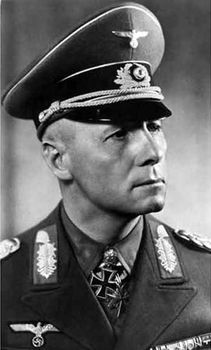ERWIN ROMMEL’S greatness was not just in his brilliant battlefield victories, but also in his ability to convert defeats into planned and systematic retreats, so that the men could be regrouped to launch another offensive at the very next window of opportunity. It was also in his mastery of his weapon systems. He was one of the first German generals to use the legendary 88mm Flak anti-aircraft gun in an anti-tank role, with devastating effect.
His book Infanterie Greift An (Infantry in Attack) is considered an important work, read even by General Patton of the US army. There is an interesting scene in Patton, the Hollywood film. Patton lays a trap for Rommel’s retreating Afrika Korps. As Rommel realises this, he orders his 10th Panzer Division to hastily retreat to original positions. Patton, observing Rommel's manoeuvres from an observation post, remarks, “Rommel, you magnificent bastard, I have read your book.”
Rommel’s swashbuckling attitude as an armoured commander was a constant source of worry to his seniors. He pushed through and punched weak spots in enemy lines, and attacked the opponent at the most unexpected places.
Rommel rose to prominence during the invasion of France in May 1940. In 15 days flat, his famous 7th Panzer Division, nicknamed the Ghost Division as it could appear any time and anywhere behind enemy lines, had reached the English Channel. A stunned France simply could not recover, and attempts to stop him at Flavion and Arras failed miserably.

At Arras, his panzers were proving inferior to the British Matilda tanks that had three-inch-thick armour. The Allies deployed 88 tanks. When Rommel realised that his traditional and trusted anti-tank weapon, the 37mm gun, was proving quite useless, he placed a few 88mm anti-aircraft guns on a hillock and began the lethal pounding of the Matildas. The Allies lost 60 tanks. Nobody had used 88mm guns in an anti-tank role before.
The exploits of Rommel’s Panzer Army Afrika are legendary. It was in his African campaign that he was praised by British prime minister Sir Winston Churchill. Field Marshal Claude Auchinleck wrote to his commanders that Rommel had reached “superhuman status” and that he was being thought of by British troops as an invincible general.
Before World War II, Rommel commanded a regiment that served as Hitler’s escort battalion. Hitler chose only those whom he trusted beyond doubt in this role. Eventually, during the course of war, Rommel was convinced that the state on whose behalf he was fighting had turned into a criminal one, engaging in mass murders and ethnic cleansing. He did not hesitate to join the generals who were planning to overthrow Hitler, as he was convinced that the war was lost and an honourable peace could be worked out only if Hitler was replaced.
For this, he paid the price of his life, as he was forced to commit suicide by the Nazi regime for “being aware” of the plot to kill Hitler.






